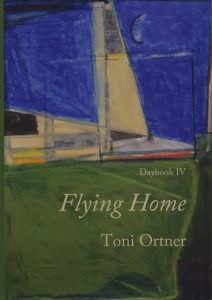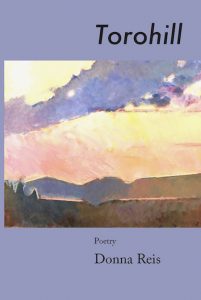Author’s Note on the Daybook series
When I read Virginia Woolf ’s idea of what a diary should contain to reveal the light of our life, I decided to write daybooks to capture the changing moments of consciousness in which we float. These are diaries that contain what is slight as well as solemn, what is funny as well as what is tragic. It is not planned but spontaneous and contains poems, prose, visions of the future, fantasies, conversations, memories, dreams, encounters, and responses to nature. I have learned that as I move through time, time moves through me.
Toni Ortner lives in Vermont where, normally, on the fourth Sunday of each month from 5- 6 PM, she hosts the Write Action Radio Hour on 107.7 FM and interviews writers and has them read their work. She is Vice President of Write Action which is a nonprofit group that supports writers in New England through a variety of events. Her work can be seen at toniortner.com. She gives readings in bookstores and libraries in Vermont and New Hampshire. Toni Ortner was an English teacher at the University of Connecticut, Monroe College, and at Bronx Community College, as well as at various high schools in New York state.
About the Author
Donna Reis is the author of two full length poetry collections: Torohill (Deerbrook Editions, 2022) and No Passing Zone (Deerbrook Editions, 2012), which was nominated for a Pushcart Prize. She is co-editor and contributor to the anthology, Blues for Bill: A Tribute to William Matthews (The University of Akron Press, 2005). Her non-fiction book, Seeking Ghosts in the Warwick Valley: 60 Personal Accounts (Schiffer Publishing, Ltd., 2003) has sold nearly 3000 copies. She has written three poetry chapbooks: Certain (Finishing Line Press, 2012); Dog Shows and Church: A Sequence of Poems (2000) and Incantations (1995) both published by Eurydice Press. Her work has appeared in numerous journals including Atlanta Review, Cimarron Review and Delmarva Review. Reis has been published in more than ten anthologies, most recently CAPS Poetry 2020: 20th Anniversary (Caps Press, 2020); Coffee Poems, Reflections on Life with Coffee (World Enough Writers, 2019); Local News: Poetry about Small Towns (MWPH Books, 2019). She received her Master of Science Degree in Education from Hunter College, The City University of New York, in 1986. A student of the late William Matthews, she completed her Master of Arts Degree in Creative Writing at The City College, City University of New York, in 2002.
Reis was born in Greenwich, Connecticut and grew up in Greenwood Lake, New York. She was married to the late musician and composer, Tom Miller. She has taught poetry workshops at The Northeast Poetry Center, College of Poetry and the Albert Wisner library in Warwick, New York. She is an avid quilter and now lives in New York’s Hudson Valley with her dog, Phoebe and her cats, Peekamoose and Pud-Tud.
Cover art: Catskill–December, painting by David H. Drake, used with permission from the artist. www.davidhdrake.com
Flying Home for August, Torohill for October
Praise for Flying Home
Toni Ortner is a truth teller, even when it hurts. She leaves the reader amazed at her ability to vividly describe the challenges of everyday life and the need for the imagination as a curative. Ortner takes her inspiration from Virginia Woolf ’s claim that a diary should reflect, “the light of our life,” yet Ortner also reminds us of the darkness. Whether in short poems or prose pieces, she casts an unflinching eye on the cruelty of politics, on personal loss, on young love, aging, and death. The writing always defaults to what she calls, “the meaning that floats between the lines.”
—Vincent Panella, author of Sicilian Dreams
Ortner’s writing is lyrical but rooted in present tense, observations deeply felt, of spiritual musings, political musings, musings about life . . . unself-conscious, but finely hewn. Many of the passages, though written in paragraph form, read as poetry. The poems can be satisfyingly evocative. At times it’s difficult to tell if a scenario is imagined or real, which for me enhanced my engagement and enjoyment. After all, the imagined can seem to the imaginer more real than “reality;” dreams can take on a life of their own and impact our relationship with the embodied world. Ortner seems to find expansion, reflection in the dream world. It adds a rich texture. That it is all together—dream, thought, memory, event, creates a fluid landscape that captures well the interstices between a rich inner life and its sometimes difficult-to-navigate outer manifestations.
—Arlene Distler, auhtor of Voices Like Wind Chimes, and This Earth, This Body
Praise for Torohill
Donna Reis’ gift for mapping the irony, hurt, love and loss of her geography is given its best expression in Torohill. Firmly rooted in the real, the collection is ever mindful of the unseen, the super real presiding over human frailty, knowing [we could be taken] at any moment, and . . . the stars wouldn’t say a word. And while deer, fox, owls, and coyotes inhabit the woods and fields of the ancestral farm that lends the book its title, they are out-numbered by ghosts that walk in soft swales of lawn where No one notices you let yourself in—[as you follow] the sound of a radio broadcasting in an office—FDR? Even the poet’s ghost is here—hit by a car at the base of the driveway at seventeen. Is the location of Reis’ life-defining auto accident at the foot of the drive to her future husband’s home unimaginable coincidence or illusion? It is Real! as is the brilliance of the words on the page, imbued with Reis’ characteristic wit, that give order in Torohill to life’s seemingly unassuageable tragedy.
―Janet Hamill
Each poem in this well-wrought collection acts as a memory-crumb in a trail through a landscape of leave-takings; sadly, the trail ends in a series of beautifully restrained poems about the death of Reis’ husband. While the predominant theme may be loss, Reis’ sense of humor and her playfulness with language fill the poems with life.
—Teresa Carson
“Make it honest,” a poetry teacher once urged, and Donna Reis’ poems perfectly embody both the honesty and the making of this imperative. Out of wreck and ruin, out of the breaks and pains that constitute the tragic comedy of our ordinary lives, Reis crafts poems of extraordinary tenderness and resilience, which are grounded in an abiding love. These are poems made to savor and to share.
—Jeanne Marie Beaumont
Poets, preachers, and financial consultants all find themselves in periods of bereavement— soldiers recruited into a vast human army. They never volunteer. The life hurts too much. To chronicle its days and nights requires a poet of accuracy, restraint, sensuality, and humor. Her language must be versatile, attuned to the gaiety of a holiday party, the mischief of a pet, silly necessities like “Miracle Whip and Woolite” and the intimate heartbreak of “The Last Night.” Donna Reis deploys the words and rhythms of this language in poems that will lift the spirits of all drudging soldiers.
—Sarah White

